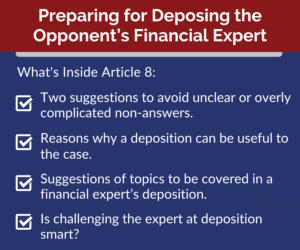
Article 8: Preparing for the Deposition of the Opponent’s Financial Expert
Welcome back to our series on working with financial experts in business litigation. If you missed the last article that explored how to help prepare the financial expert you hired for their deposition, you can read it here.
This time, we are looking at ways you can prepare for deposing the opponent’s financial expert. Too often the opponent’s financial expert takes advantage of the attorney deposing them by providing non-answers or answers that are highly technical in order to end a particular line of questioning. Let’s look at how to avoid that, to maintain focus on the pertinent topics and enable you to obtain useful answers to your questions of the opponent’s expert.

Attorney Preparation Before Deposition
Counsel needs to have a solid understanding of the opposing financial expert’s report. This is critical to preventing the opponent’s expert from getting away with non-answers or extremely technical responses. As much as the attorney has prepared for the deposition, he/she is still operating in the expert’s field and could therefore be subject to failing to ask important questions or having the expert give unclear answers but not being able to recognize it. Using the financial expert you engaged to prepare for this deposition can keep you in the driver’s seat.
Here are two ways to accomplish this:
- 1) In preparation for developing the questions to ask, first have your expert rebuild the opponent’s expert’s analyses/spreadsheets. This is valuable for identifying math errors that undercut the credibility of the expert, no matter how small, and determining the key assumptions used that drive the expert’s conclusion. Rebuilding the analysis also helps develop questions for the opponent’s expert that are more specific and more difficult to avoid answering directly.
- 2) Have your financial expert attend the opponent’s expert’s deposition. This can be instrumental in sifting out such ‘non-answers’ and providing real-time guidance about how best to frame follow-up questions(s).
Beyond just writing their own report, when it comes to reviewing the opposition’s report, the financial expert you have engaged can be very helpful in explaining the analyses and conclusions reached, identifying any errors made, and assisting you in preparing questions.
As we noted in an earlier article in this series, most financial experts don’t understand the law and most attorneys don’t understand accounting and finance. Recognizing and embracing these differences allows the two groups to work together to leverage each other’s strengths.
Attorney Preparation–What Can Be Gained in a Deposition?
A good starting point might be to consider why a deposition should be taken in the first place. Summarized below are some of the primary reasons:
- 1. Learn what the witness does not recall and what he/she never knew.
2. Learn the story of their analyses and conclusion. What does the witness know and how important/relevant is it?
3. Identify who the expert relied upon for facts used.
4. Identify key assumptions used by the witness. Have they used incorrect assumptions?
5. Stake down the expert’s opinions and the basis for such opinions.
6. Evaluate the witness’s independence.
7. Obtain helpful admissions for motions or trial.
8. Authenticate documents.
9. Test how the witness responds to different styles of questioning.
10. Evaluate the deponent as a trial witness. Are they able to explain effectively the complex concepts to a layperson?
11. Preserve testimony of a witness unavailable for the trial.
Generally, the areas to be covered in an expert’s deposition will vary from case to case, but potential areas to cover include:
- ● General educational background
● Areas of claimed expertise
● Education in the field
● Job history, terminations, multiple careers
● Work experience in the field, practical experience
● Published works
● Other cases where expert provided testimony
● Search for any sign of resume enhancement
● Materials relied upon
● How the expert first learned of the case
● Prior contact with counsel who engaged them or work with counsel who engaged them
● First meeting with counsel—“Did counsel tell you what they needed?”
● All communications with counsel—written, digital, verbal
● Engagement letter—what was the expert asked to do? What did the expert actually do?
● All communications with outsiders
● Notes and emails—was anything destroyed?
● Review methodology used
● Ever given an opinion on this subject before?
● Readings/research used
● All things relied upon to give opinion
● Theories or methodologies rejected?
● Process of preparing report—exchange of drafts with counsel; changes suggested by counsel
● All opinions reached—test all assumptions
● Order in which all tasks were performed
● Work remaining to be done
● Comments on your financial expert’s report—has the opponent’s expert been asked to review your expert’s results? If so, what conclusions has he or she reached?
It is typically not advisable to challenge the expert during deposition with everything the attorney will be able to challenge him or her with at trial. If the attorney challenges the expert in deposition, the expert will only be alerted to the challenge, and will likely be better prepared to handle it in trial.
Conclusion
A successful deposition of the opponent’s financial expert results in counsel gaining an understanding of the expert’s demeanor, the timeline of work completed, the documents, contacts, and information relied upon, the assumptions made and the basis for each assumption, and the process for arriving at their opinion(s). Consider it more of a fact-finding exercise than a time to challenge the expert.
Coming up Next Time
Next time, we will consider how counsel can best work with the experts in preparation for, and at, trial.
We’re Here to Help
Hiring the right financial expert can have a significant impact on your case. Based on our firm’s 45+ years of experience focused entirely on determining damages and valuing businesses, we can provide insight, experiences, and ideas for ways to approach the financial portion of your litigation project that you may not have encountered yet.
Stay tuned to your inbox and follow Capital Valuation Group on LinkedIn as we share more from this series on successfully navigating each phase of the litigation process. If you have a particular situation you would like to discuss, give us a call. We are happy to have a complimentary initial discussion.
Would you or other people in your firm find value in this series? Please share or they can subscribe to our email list here.

Cathy Durham is a principal of Capital Valuation Group, Inc., headquartered in Madison, WI. Capital Valuation Group has been helping business owners across the country understand, increase and unlock the value of their businesses for over 45 years through keynote speaking, valuation analysis, determining damages and providing expert witness testimony. Cathy welcomes conference and event speaking inquiries and can be reached at cdurham@capvalgroup.com. Phone 608-257-2757
